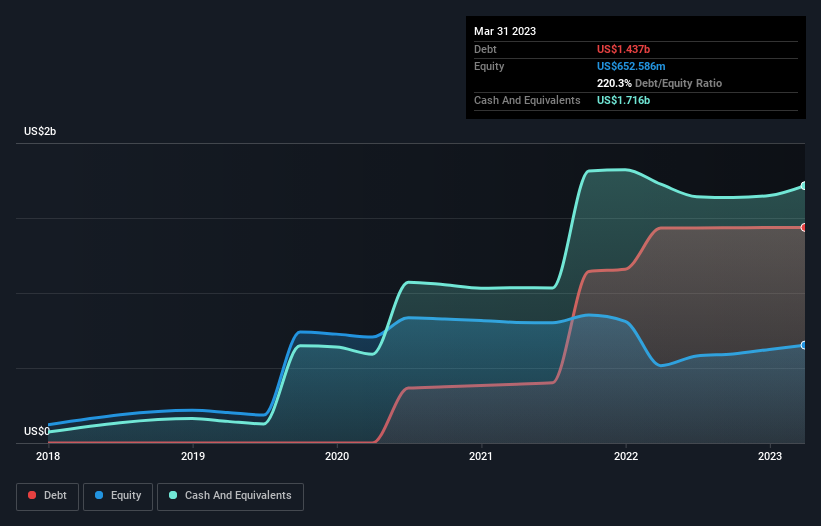
Howard Marks put it nicely when he said that, rather than worrying about share price volatility, 'The possibility of permanent loss is the risk I worry about... and every practical investor I know worries about.' It's only natural to consider a company's balance sheet when you examine how risky it is, since debt is often involved when a business collapses. We note that Cloudflare, Inc. (NYSE:NET) does have debt on its balance sheet. But the more important question is: how much risk is that debt creating?
When Is Debt Dangerous?
Debt assists a business until the business has trouble paying it off, either with new capital or with free cash flow. In the worst case scenario, a company can go bankrupt if it cannot pay its creditors. While that is not too common, we often do see indebted companies permanently diluting shareholders because lenders force them to raise capital at a distressed price. By replacing dilution, though, debt can be an extremely good tool for businesses that need capital to invest in growth at high rates of return. The first step when considering a company's debt levels is to consider its cash and debt together.
View our latest analysis for Cloudflare
How Much Debt Does Cloudflare Carry?
As you can see below, Cloudflare had US$1.44b of debt, at March 2023, which is about the same as the year before. You can click the chart for greater detail. But on the other hand it also has US$1.72b in cash, leading to a US$278.2m net cash position.

A Look At Cloudflare's Liabilities
We can see from the most recent balance sheet that Cloudflare had liabilities of US$444.5m falling due within a year, and liabilities of US$1.57b due beyond that. On the other hand, it had cash of US$1.72b and US$187.8m worth of receivables due within a year. So its liabilities outweigh the sum of its cash and (near-term) receivables by US$111.6m.
This state of affairs indicates that Cloudflare's balance sheet looks quite solid, as its total liabilities are just about equal to its liquid assets. So it's very unlikely that the US$22.1b company is short on cash, but still worth keeping an eye on the balance sheet. While it does have liabilities worth noting, Cloudflare also has more cash than debt, so we're pretty confident it can manage its debt safely. There's no doubt that we learn most about debt from the balance sheet. But ultimately the future profitability of the business will decide if Cloudflare can strengthen its balance sheet over time. So if you're focused on the future you can check out this free report showing analyst profit forecasts.
Over 12 months, Cloudflare reported revenue of US$1.1b, which is a gain of 44%, although it did not report any earnings before interest and tax. Shareholders probably have their fingers crossed that it can grow its way to profits.
So How Risky Is Cloudflare?
Although Cloudflare had an earnings before interest and tax (EBIT) loss over the last twelve months, it generated positive free cash flow of US$39m. So taking that on face value, and considering the net cash situation, we don't think that the stock is too risky in the near term. One positive is that Cloudflare is growing revenue apace, which makes it easier to sell a growth story and raise capital if need be. But we still think it's somewhat risky. The balance sheet is clearly the area to focus on when you are analysing debt. But ultimately, every company can contain risks that exist outside of the balance sheet. For example, we've discovered 2 warning signs for Cloudflare that you should be aware of before investing here.
At the end of the day, it's often better to focus on companies that are free from net debt. You can access our special list of such companies (all with a track record of profit growth). It's free.
New: AI Stock Screener & Alerts
Our new AI Stock Screener scans the market every day to uncover opportunities.
• Dividend Powerhouses (3%+ Yield)
• Undervalued Small Caps with Insider Buying
• High growth Tech and AI Companies
Or build your own from over 50 metrics.
Have feedback on this article? Concerned about the content? Get in touch with us directly. Alternatively, email editorial-team (at) simplywallst.com.
This article by Simply Wall St is general in nature. We provide commentary based on historical data and analyst forecasts only using an unbiased methodology and our articles are not intended to be financial advice. It does not constitute a recommendation to buy or sell any stock, and does not take account of your objectives, or your financial situation. We aim to bring you long-term focused analysis driven by fundamental data. Note that our analysis may not factor in the latest price-sensitive company announcements or qualitative material. Simply Wall St has no position in any stocks mentioned.
About NYSE:NET
Cloudflare
Operates as a cloud services provider that delivers a range of services to businesses worldwide.
High growth potential with excellent balance sheet.
Similar Companies
Market Insights
Community Narratives



